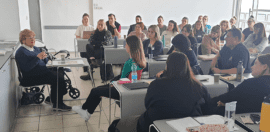Empowering Girls to Become Leaders
11 July 2016 at 11:22 am
Nicky Mih is CEO of Free to Shine, an Australian based Not for Profit, that works with girls at risk of being forced into the sex industry in Cambodia. Mih is this week’s Changemaker.
Free To Shine started after Mih, who always wanted to work with women or girls on an issue, spent a month with more than 200 survivors of child sex slavery.
The organisation identifies girls at high risk of being targeted by traffickers, and gives them a uniform, a bike, a bag filled with books and pens, and visits them regularly to keep them safe and in school.
The long-term goal is to help these girls become leaders in their communities.
In this week’s Changemaker, Mih talks about getting the girls in school before the traffickers get them into brothels, the many unexpected issues that go with that, why all humanity has a responsibility to help, and how “all that is necessary for evil to prevail is for good men to do nothing”.
How did Free to Shine start?
It started about six years ago, just over six years ago… so it was December 2009, because I had read books about women and girls being exploited in all manner of different ways in all different countries, and I had always known that I wanted to work with women or girls on a issue, but I didn’t know which issue or which country or whatever. And then I learnt about sex trafficking in Cambodia.
Being in Australia I thought, well, Cambodia is pretty close, you can’t just leave that to America and England and other places, we are basically the nearest neighbouring country with the ability and resources to assist. So in December 2009 I actually went over and spent a month with more than 200 girls, who had actually been rescued from brothels. And nearing the end of my month when I was leaving, I asked them what I could do to help them from Australia.
I said I would get a group of maybe about 30 women together, and we would do something for an hour a day, and we would do something to help them and what would they like? Because I didn’t want to be that person that rides in on a white horse and we’ve got these ideas of how to fix it for you. I didn’t want it to be like that. So I just thought we would help them. They were learning sewing and hairdressing and I just thought maybe we would help them sourcing fabric or patterns or something, anything simple I thought. And their answer to me when I asked them that question was, “…the brothel owners don’t go without a girl, so we are fine, but the day we got rescued they just went out and took another girl from a rural village, so now they’re in there because we are out here, so we’re ok, we don’t need anything from you but please go out into the rural villages and find the girls who aren’t in school and put them in school, because we weren’t in school when we were trafficked.” And I looked around the room and they were all shaking their heads, not one of them was in school when they were trafficked. So their answer was to go into rural villages and get the girls in school before the traffickers get them into brothels. That way they believed they would be safe.
So I did lots and lots of research following that and all the literature backed that up as well, so here I was having people with firsthand experience saying to do this, the research backed up that’s what was necessary and should be happening, so I looked for an organisation that was doing that so we could just volunteer an hour a day to somebody else, and it wasn’t there. It wasn’t happening.
There were organisations rescuing girls, and there were other organisations working in the legal system to bring about prosecutions, which obviously is also needed because it will deter traffickers, but there was nobody actually preventing the traffickers from getting new girls, so that’s why we set up.
Your approach is not to rescue or fix, but to empower through education, why is it important to put the solution back onto those who have been affected?
It is critically important, because who are we? We haven’t lived their lives, we haven’t experienced what they’ve experienced. It is critical from the perspective that we don’t know, so how could we sit in a class or read a book that tells us, we have got to work together, we have got to use our resources and experience and education but working very much as a team, working very much with them, what do they say they want and need? Because if they don’t want it, they’ll not utilise it, and there’s lots of research in the development sector that supports that as well, if somebody comes up with a good idea they’ll say “yes, yes”, and you’ll start to implement it and you’ll find it just falls down because it never came from them, so I think it is about working together.
What does a typical day for you involve?
That’s such an impossible question to answer. I do not have a typical day, there is no such typical day, every single day is different and I guess that’s something that I love about it. It keeps it fresh and new all the time… I suppose it is a little easier to say what we might do within a week, because there is a little bit more uniformity within a week.
So obviously you are working so much on program stuff, so…we have education outreach officers but it’s very, very similar to a social work program, so we are constantly evaluating and improving the social work skills of our young team, we have got a team of 18 Cambodians, young professionals, roughly aged about 22 to 26, so we’re constantly up-skilling them so they can do the social work, really competently, really, really well. So a lot of time is spent on program, working with our coordinator in Cambodia to help her identify areas, other parts of the day are spent with donors and fundraisers here to bring the money in to support the program over there, the last hour before I was speaking to you was just trying to get our website back up and running, that had come down… I just managed to get that back up and running with the help of a volunteer. Everything. There are so many different aspects, and different issues and challenges coming up. Because when I first started it was very much… enabling girls to go to school in order to prevent sex trafficking. But what I didn’t know six years ago, that I do know now and comes up every day, is getting girls into school and then obviously keeping them there, there is a whole host of issues you need to address in order to keep them there.
So our girls are living in such extreme poverty that they’re really hungry, so a family’s top priority is not a child’s education if all members of that family are hungry. So, we’re having to help them grow vegetable gardens etc in order to have enough food, so they don’t have to go out earning money to spend money on food, another thing is safe drinking water, because they are getting sick from drinking stagnant pond water and things, and there is free healthcare through charities for children but nothing for any adults, so it’s really expensive if an adult gets sick, so let’s say dad gets sick, so that means their whole family is losing dad’s income for those days that he’s sick, there is no such thing as sick cover, it is just a daily wage that he’s got, then on top of losing that income they have also got to then pay medical bills, he’s got to go see a doctor, get medications etc, so that another reason why children drop out of school, so we’re having to address all these different issues, from food, to drinking water, to alcohol abuse etc. just so our girls can stay in school.
What are your current priorities?
Our current priorities are sourcing the ongoing funding for the 700 girls that we have got in school. So we’ve got permanent ongoing funding for 350 of those girls, that means that we have still got 350 girls that we’re working with on a month by month basis but we need to gain security for those, we need to make sure that they are going to be able to stay in school right through to when they finish grade 12, so I guess our first priority is securing the funding for those and then reaching more and more girls, because we have got 700 girls, which is fantastic now, but there are still more girls at risk.
So we’re looking at reaching 1,000 in the Siem Reap province, and it might be a 1,000, it might be 1,200, we’ve got a few more villages and communes to assess, and then once we’ve done that, we’ve got such a good program now, we want to replicate that in another area of Cambodia.
What challenges are facing your organisation?
Loads! Where shall we start? Challenges, take the website today for example, there is a challenge. It is trying to do things on a shoestring. We don’t have the budget to call in an IT expert, so it’s a case of trying to figure out for ourselves, why is the website down, what do we have to do, how do we do this. And then the biggest challenge of last month was a drought in Cambodia, last year the rainy season was a lot shorter than usual rainy seasons and then this dry period has been so much hotter and drier and longer so the water that they got in the rainy season didn’t last them all the way through this dry season, so we had this really scary period of about two weeks where it was looking like some of our family members could start to die if not having enough water to drink, there just wasn’t enough water. So it’s challenges like that, where you just don’t know what you can do about climate change in order to help these kids go to school, it’s kind of out of our scope. Luckily the rains have begun, not enough for them to grow enough vegetables and rice, but at least enough for them to drink and stay alive at the moment, so challenges like that.
You were a winner of last year’s Australian Ethical grants, how important is it that the corporate world supports NFPs?
That’s a really good question. I guess I don’t necessarily divide it into categories of corporate and Not for Profit. For me it is about humanity, it is every human’s responsibility, if you have got your own human rights, then I believe you have a responsibility to assist somebody else, in whatever issue that is that you take on.
There are that many different struggles in the world, and that many people with the ability to assist, just pick one and do it. And that obviously goes for corporates and businesses because they are essentially made up people so if you can leverage from your business or your corporation to assist humanity and assist the world, then one would guess that would be the point of doing business in the first place. To improve the world.
What is the future direction of Free to Shine?
Our plan is to keep doing what we’re doing and to replicate it in more areas so that we reach more and more girls. So if we can reach 1,200 girls in the Siem Reap area, then replicate it in Battambang province and reach 1,000 or 1,200 girls in Battambang, and keep doing that in different provinces and then beyond there in neighbouring countries, so not just Cambodia, any country where sex trafficking is prevalent, then we need to be empowering girls to be safe in school. And then focussing as well, I guess as time goes by and we grow, and build our capacity, it won’t just be about keeping them in school in order to keep them safe from being trafficked, it will be about really focusing on developing their leadership skills because my belief is that, say we’ve got 1,000 girls in the Siem Reap province, it is them 1,000 girls becoming leaders of their communities, whatever businesses they go into in 10 years time, for them to become leaders in their business and for them to create a Cambodia that does not allow sex trafficking. So I guess doing that in every community and country where sex trafficking is so prevalent.
Are the girls who have been through the program already on their way to becoming leaders?
We’re still actually really young, so even though we began this journey six and a half years ago, we piloted our program four years ago, and we really just began the program three years ago.
So actually we do, we have got four that graduated, one that went on to vocational training, so she is learning skills that will be able to assist her family and neighbours and we’ve actually got three that have gone on to university, two are studying law. And because we pay their university fees, we don’t ask them to pay anything back to us but we also don’t give them stuff for free. As a child we don’t want anything from them, it is your child’s right to go to school… but by then helping them beyond grade 12 and into university we then ask them to pay it forward so they are already doing things in their communities for the next generation of kids, they’re holding small classes and teaching them things, so our girls are already leading.
We’ve got one girl who is 13 and she has just started, she has been doing it for about four months, she has been teaching basic maths and basic alphabet in English to a group of eight children that live near her, so they’re about I think grade 4, so they are about four or five years younger than her, and she’s charging them a tiny, tiny amount per month and she is now making $2.50 a month, which is helping her access her own additional classes and school resources and things like that, as well as passing on what she knows, even though she’s only three of four years ahead of where they are.
So, yeah, they are so keen to develop their communities, and we talk to them about Free to Shine are bringing you and your families your human rights but Free to Shine can’t reach everybody in Cambodia, we’ll bring it to you and then it is up to you to bring it to the other 300 families in your village and that’s what they’re aiming to do. They’re not resourced at being able to do that, they can’t provide water filters to people but they are starting with education, educating the families on why it’s not safe to let your animals go in your water, because you’re going to be drinking that water and things, so they’re really committed to being leaders and improving their communities.
What do you consider to be your greatest achievement?
I guess it has to be as simple as the fact that we have reached 700 girls and their siblings and families. It would be that.
You must have seen and heard a lot of confronting stories, how do you stay motivated in the face of that?
Probably having heard those shocking stories, and I met those girls that had lived those shocking stories. They are the strongest girls and young women you could ever imagine meeting, I don’t think I would have that kind of strength, so when you have heard those stories, for me anyway, that motivates me. I don’t want any other child to go through what they had to go through. So when we know from them that doing this is preventing another child from going through that, it doesn’t matter what challenges and obstacles we encounter, we just encounter them and go through them. It is built into what we do, it is right there, every hour we spend, even when it doesn’t feel like it is directly related to a girl, like working on a website, you know that that is to improve the capacity of Free to Shine so that we can reach from 700 girls to 710 to 720 etc. So that’s the motivation, making sure other girls are not raped and tortured.
Do you see yourself staying in the Not for Profit sector for the rest of your career?
I can’t imagine doing anything else. So I get up in the morning and I know that I am spending my day in the best possible way that I could, I can’t think of anything more important that doing this. So I have no reason to do anything else.
Do you have a favourite saying?
I have millions of favourite sayings. We love quotes. We have quotes all over our walls in Cambodia, we have them all over our Facebook page, we love quotes, but it links back to what motivates me, the driving quote that stays with me is Edmund Burke, which is “all that is necessary for evil to prevail is for good men to do nothing” and I think what happens in this world today, in so many different ways, not just sex trafficking, in so many different ways, all that is wrong with the world, I don’t think it comes down to evil people, I think it comes down to that apathy of the rest that allows those few evils to work, so I think it is about good men stepping up and doing something.








